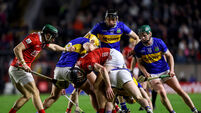Commandos tasked with flushing out Afghan fighters
British Royal Marine commandos were today preparing to deploy to Afghanistan as part of a major operation to help US forces flush out al-Qaida and Taliban fighters still holding out in the Afghan mountains.
The deployment - which will eventually total 1,700 men, making it the largest British war-fighting force to be sent overseas since the 1991 Gulf War - follows a specific request from the US for Britain’s elite mountain warfare troops to help crush the remnants of forces loyal to Osama bin Laden.














